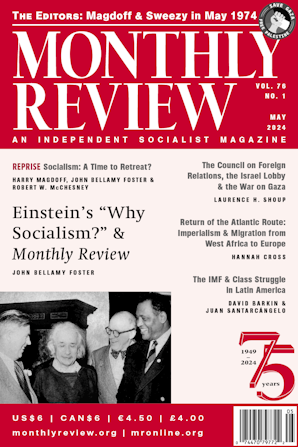Also in this issue
- May 2024 (Volume 76, Number 1)
- Einstein's "Why Socialism?" and 'Monthly Review': A Historical Introduction
- The Council on Foreign Relations, the Israel Lobby, and the War on Gaza
- The IMF and Class Struggle in Latin America: Unveiling the Role of the IMF
- Socialism—A Time to Retreat? The Perspective of ‘Monthly Review’ at the Opening of the Twenty-First Century

